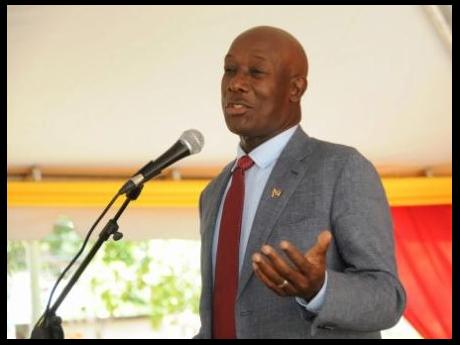Trinidad announces minor relaxation of some COVID measures
(CMC): The Trinidad and Tobago government today announced a minor relaxation of some measures aimed at curbing the spread of COVID-19, but maintained that churches, restaurants and bars would remain closed until, at least, October 24.
Speaking during a Ministry of Health news conference, Prime Minister Dr Keith Rowley, said his administration was working towards preventing another lock down, since it would result in a financial burden to the state and further cripple the economy.
Rowley revealed that first lock down had been funded by borrowing adding “we now have to build on that foundation by not incurring that expense and how do we do that, we do that by being very careful about how we use the space that we get by virtue of the good response we make to the virus, it gives us space to slow down the virus…," he said.
He continued: “If we overdo it we run the risk of needing to go back into a lock down and that’s the last thing that we want and that is why we have looked very closely at the numbers, the projections and the models as to what is likely to happen if we do not carefully manage our coming back out”
Latest figures issued by the Ministry of Health show that there are 5,043 positive cases of the disease with 90 deaths. There are 1,776 active cases in Trinidad and Tobago.
Rowley said based on the advice of the medical experts, the government would allow for “some adjustments” to the measures and protocols already in place.
He said the adjustments “would allow us still to be wary of the spread of the virus, but we step forward a bit”.
He said that as a result, the number of people allowed to congregate has been increased to 10 from five and that persons attending funerals will move from 10 to 20.
In addition, the state-owned Caribbean Airlines (CAL) will operate six flights daily between Trinidad and Tobago, up from the present two flights, with Rowley indicating that this would also help to alleviate the economic hardship on the sister isle.
“We have been very concerned about the effects of the current approaches on Tobago where Tobago is so entirely dependent on a [number of activities], with those activities by themselves being the ones that are most detrimental …but we need to keep some life going in Tobago’s economy and we have agreed that there should be more traffic between Trinidad and Tobago,” Rowley said.
Rowley said that he had also been lobbied by the clergy in an effort to have the resumption of religious services.
“It is our view that if there is no significant upward tick in our concentrations now [and] by the 24th of this month, we should be able to make the changes that would bring back activities into the churches and other places of worship and we can do a bit more for bars and restaurants," he said.
“That being so, what you would have gathered from what I have said we are taking slow steps forward again hoping that there will be a continuation of the cooperation of the national population with the protocols which seem to be working for us…”
Possible sanctions for public servants
Rowley also expressed disappointment that public servants were staying away from work, despite measures in place to ensure the public service continues to function. He said as a result, new measures will be instituted, and he hinted at the possibility of workers not receiving pay if they failed to turn up for work.
Trinidad and Tobago's borders remain closed, even as National Security Minister Stuart Young informed today that repatriation flights were being undertaken.
Regarding the plans by the regional integration grouping, CARICOM to establish a “bubble” to facilitate intra-regional travel, Rowley said “CARICOM is still operating in some semblance of a sharing of space, but the challenges have not gone away."
“Some new challenges occurred within the bubble and the intention was that we all would try to be at the same level of infection and control so that our populations would not be at any additional risks by mixing. We have not got to that yet because…some countries, the small territories have always had smaller exposures and smaller responses fortunately, they still remain among the least, numerically, infected."
“The bigger territories are the ones still struggling,” Rowley said, adding “so we have not yet all come down to the designated number of 20 per day and that is still a little way off.
“We are outside of that and most of our CARICOM colleagues, however, we are hopeful if our populations are well managed and they are cooperative that we, by and large, could get down to lower numbers, but where we are not able to respond appropriately it is to be expected that the numbers could get larger,” Rowley said.
Follow The Gleaner on Twitter and Instagram @JamaicaGleaner and on Facebook @GleanerJamaica. Send us a message on WhatsApp at 1-876-499-0169 or email us @onlinefeedback@gleanerjm.com or editors@gleanerjm.com.

